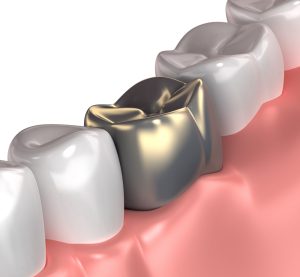Metal Dental Crowns in Centuria, WI
Please note we may not offer this service at our office. Call (715) 646-2161 for more information.
Discover How a Metal Dental Crown Can Restore Your Tooth
When choosing dental crowns, there are several materials available, with metal being one of the most prevalent. Metal-based dental crowns have been a reliable choice for many patients over the years.
For more information on metal dental crowns, reach out to our dentist in Centuria, WI by calling (715) 646-2161 today.
Understanding Metal Dental Crowns
Metal dental crowns have been trusted for decades due to their strength and durability, making them ideal for back teeth. These crowns effectively resist wear and tear and can handle substantial force.
Materials Used in Metal Dental Crowns
There are different types of metal dental crowns, including:
- Gold crowns crafted from gold alloy, known for its high biocompatibility and resistance to corrosion.
- Silver crowns made from a mix of silver, tin, and other metals, offering durability and affordability but may discolor over time.
- Platinum crowns constructed from platinum alloy, providing strength, durability, and corrosion resistance, though they are pricier.
- Palladium crowns composed of palladium, gold, and other metals, suitable for patients with metal allergies.
- Base metal alloy crowns made from non-noble metals like nickel, chromium, and titanium, known for strength and affordability, though they might cause allergic reactions.
Advantages of a Metal Crown
Receiving a metal crown offers several benefits, such as:
- Strength and Durability: Exceptionally strong, these crowns can withstand significant pressure, making them perfect for back teeth.
- Longevity: With proper care, they can last for many years, often exceeding 20 years.
- Preservation of Natural Tooth Structure: They require minimal removal of natural tooth structure compared to porcelain or ceramic crowns.
- Resistance to Wear and Tear: Less prone to chipping or breaking than other crown types.
- Biocompatibility: Metals like gold and palladium used in dental crowns are highly biocompatible and less likely to cause allergic reactions.
Potential Drawbacks
Consider these drawbacks when opting for a metal crown:
- Appearance: Not tooth-colored, metal crowns may be more visible, especially on front teeth.
- Heat Conductivity: Metal crowns can conduct heat and cold, potentially causing discomfort.
- Wear on Opposing Teeth: Their hardness may lead to increased wear on opposing teeth.
- Cost: Depending on the alloy, metal crowns might be more expensive than other types.
- Allergies: Rarely, patients may experience allergies to certain metals in dental crowns, leading to inflammation or other issues.
The Metal Dental Crown Procedure
 Preparation and Impressions
Preparation and Impressions
The initial step involves preparing the tooth. The dentist will remove decay or damage and shape the tooth to fit the crown, possibly building it up if necessary.
After preparation, impressions of the tooth and surrounding teeth are taken and sent to a dental lab to create a custom-fit crown. Meanwhile, a temporary crown is placed to protect the tooth.
Crown Placement
Upon receiving the permanent crown, you’ll return for the placement procedure. The temporary crown is removed, and the new crown is adjusted for fit.
Once the fit is perfect, your Centuria, WI dentist will cement it in place with dental adhesive and check your bite for proper alignment with opposing teeth.
Follow-Up Care
Post-placement, you’ll receive instructions on caring for the crown. Maintain good oral hygiene, including regular brushing and flossing, to keep the crown and surrounding teeth healthy.
Metal Crown Costs
The cost of metal crowns varies based on factors like location, dentist’s expertise, case complexity, and additional procedures. Generally, metal crowns are more affordable due to material costs and simple fabrication.
The average cost ranges from $800 to $1,500 per tooth, though prices can differ. Dental insurance coverage may influence out-of-pocket expenses, as some plans cover part of the cost.
Alternative Crown Options
 Due to aesthetic concerns with metal crowns, patients often explore other options:
Due to aesthetic concerns with metal crowns, patients often explore other options:
- Porcelain-Fused-to-Metal (PFM) Crowns: These combine a metal base with porcelain for a natural appearance and strength. However, the metal base might show if gums recede.
- All-Porcelain or All-Ceramic Crowns: Made entirely from porcelain or ceramic, these offer excellent aesthetics similar to natural teeth, though they may not be as strong as metal or PFM crowns.
- Zirconia Crowns: Utilizing strong ceramic material, zirconia crowns can be layered with porcelain for better aesthetics, suitable for both front and back teeth.
- Composite Resin Crowns: Crafted from a plastic and glass mixture, these are less expensive but may wear down faster than other materials.
Frequently Asked Questions
Yes, metal crowns are generally considered safe. They have a long history of success. However, discuss any allergies or concerns with your dentist.
With proper care, metal crowns can last up to 20 years or more. Their lifespan depends on oral hygiene, diet, and general wear.
While generally safe, metal crowns can interfere with MRI (magnetic resonance imaging) by causing artifacts on images. Inform your healthcare provider about your metal dental crown before an MRI.
